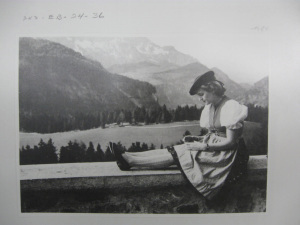Phyllis Edgerly Ring's Blog, page 18
March 2, 2016
Memes & themes: her own happiness
Thank you so much, reviewer Teresa Kander, for your good words about The Munich Girl at your MemesandFiction blog.
While the novel is often characterized as historical fiction, and a book about Eva Braun, I especially appreciate that you pointed out in your review some of the themes that make it women’s fiction, too:
“… a story of three women, two from the past and one from the present. …
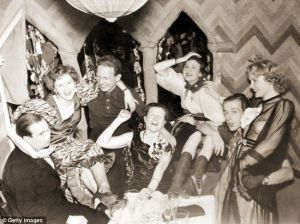 Each of the women chooses to put the happiness of someone else above the happiness of herself, which we see have adverse consequences for each of them.”
Each of the women chooses to put the happiness of someone else above the happiness of herself, which we see have adverse consequences for each of them.”
http://linkis.com/www.bloglovin.com/bl/zQOlf
More information about
The Munich Girl: A Novel of the Legacies that Outlast War
can be found here: http://www.amazon.com/Munich-Girl-Novel-Legacies-Outlast/dp/0996546987/ref=sr_1_1?ie=UTF8&qid=1456762512&sr=8-1&keywords=The+Munich+Girl


February 28, 2016
In a full heart there is room

Wertheim flowerbox photo: Jon Ring
Just like one of the characters in my novel, my mother had a Leap-Year birthday on February 29. As my sister and I remember her this year, I’m grateful to share a guest post from my sister that carries my mother’s voice — unmistakable to my inner ear, across years and the incomprehensible distance between this life and the next — in ways that leave my heart astonished.
It was captured at a time of unbearable loss, and unfathomable mystery, just the sort of atmospheres in which our mother knew how to accompany us.
Guest Post
By Tracey Edgerly Meloni
I need my mother.
I’m twelve years too late, but never have I needed her more than at this moment. Her last words to me were, “I’ll always be with you,” though I doubt either of us believed that she was being literal.

Photo: Karen Olin Darling
This is not what I expected, this waiting for Bob, the last time I will see him in this hospital, the last time I will touch his hand, brush his lips with mine. Sometime between when a tinny voice called me in the middle of the night and when I arrived here, he was spirited away from his sterile ICU cubicle (now stripped and eerily empty) to this unknown room I am waiting to enter. The Visitation Room, they call it. Doctors, nurses, orderlies and general helpers bustle past; no one looks at me.
I am sitting in the Dead Zone, an awkward limbo to hospital personnel: the patient is no longer here, but has not yet left the building.
Don’t worry — you know they are getting him ready. And I will be with you.

Painting, “Movement” by Diane Kirkup
Mum is here – that deliciously throaty voice, Helen Mirren meets Lauren Bacall, her Arden scent wrapping around me like her slender arms.
Yes, I do know, after years as a doctor’s wife,
I know about “getting him ready.” Removing the tubes and wires, masking the bruises, the torn skin, the paddle burns; erasing that final image, the moment of knowing alarm, from his features. I’ve been there hundreds of times, but not with my Bob being the one readied. Definitely I am looking through the wrong end of the telescope.
Let’s go away somewhere for now – pick your happiest memory.
There were so many … let’s go with Turks and Caicos, 1987, before the Glitterati discovered it, when only one gas pump, a Club Med and the most glorious scuba diving in the hemisphere defined it. When torrid and wine-drenched afternoons were spent lying naked under the lazy ceiling fan …
 OK, enough … I am your Mum, after all, and you were a long way from married then … pick another memory.
OK, enough … I am your Mum, after all, and you were a long way from married then … pick another memory.
In Venice, on the Grand Canal, in the bridal suite of the Regina-Europa, toasting Mum’s leap-year birthday at a time when no sane person goes to Venice.
Or in Cairo, having dinner at sunset on the Nile …
Or in Djibouti, where “Bombay Bob” gained fame on our 100-passenger explorer vessel for my dubious lyrics, to the tune of the old “Pretty Baby:”
“If you miss the final shuttle
Say GOODBYE, your cruise is scuttled,
In Djibouti today!”
Naked stuff there, too, yes?
 There, and everywhere. Soul mates and best friends and … yes.
There, and everywhere. Soul mates and best friends and … yes.
“Mrs. Meloni? You may come in now – and my condolences.”
Mum says nothing – For this, I must step forward on my own.
The room is ridiculous, chintz and lavender wallpaper and a rocking chair, as if I am welcoming him to the world, not saying goodbye.
He is clean, pink, scrubbed – no sign of the odious central line that became so infected, all evidence of his cracked chest, ventilator, bedsores and other bodily harm hidden by an Amish quilt. Terrible music – Mantovani Mediocrity, elevator music – plays softly in the background. Tears, the unbidden, unattractive snotty-nosed kind, threaten.
No, no, no! We don’t cry for bad taste and worse music. Get everyone out of here and be alone with him – capture what you need.
I ask everyone to leave. I kiss his forehead, his earlobe, his neck. I slide off his wedding ring, knowing I will wear it on a chain around my neck, maybe forever. I marvel at his peaceful expression, so different from yesterday’s angst. I long to stroke all of him, but know that those days are over.
Never again will we lie naked together, under a lazy ceiling fan.
Some not-quite-a-nurse person hands me a plastic bag: the dead man’s stuff, no longer needed. Glasses and underwear and a book he never read about Cole Porter.
I think of his spider-quote from EB White: “and I … as spiders do, attach one single thread to you, for my returning …”
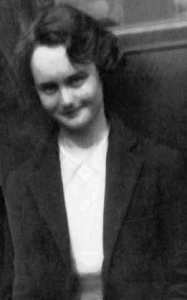
Peggy Wilson Edgerly, 29 Feb. 1920 – 4 Nov. 2000.
You’ve forgotten Antonio, she reminds me; we both love Antonio Porchia, especially “in a full heart there is room for everything and in an empty heart there is room for nothing.”
I cock my head to one side, holding Bob’s hand gently, wondering what she will say, and if she will come back again.
She blows me away:
Man, when he does not grieve, hardly exists.
A heart full of thanks to writer Tracey Edgerly Meloni


February 26, 2016
The journeys of writing, and history
Oh, the gift, for a writer, of receiving response to the work you set out into the world.
Over this last week, I’ve encountered heartening and thoughtful words about The Munich Girl both in person and in print.
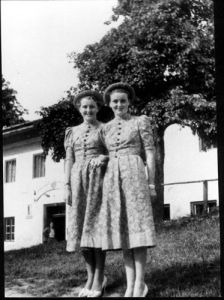 In reflecting on the story’s historical time frame, reviewer Steve Pulley voices almost the exact feelings I’ve had myself lately, as I observe our world:
In reflecting on the story’s historical time frame, reviewer Steve Pulley voices almost the exact feelings I’ve had myself lately, as I observe our world:
“What went on in the world in the 1930s and ’40s sound disturbingly similar to what we are currently going through today, and cannot but give one pause.”
Reviewer aaward kindly sums up the novel as:
“intricately woven historical fiction. The tale of two friends starts before the beginning of World War II and encompasses all the situations and emotions that the war brought into their individual lives as well as into their continuing friendship.”
It’s extra-meaningful when readers make that connection with the themes of the power of spiritual friendship and shared emotional intimacy that each help human beings transcend even the most painful, destructive, or confusing circumstances life brings.
Those are a big part of the reason why this book was written at all. 
At her Beach Bound Books blog, reviewer Stacie Theis kindly calls the book:
“an absolutely consuming story that takes readers on a journey into history … secrets of the past.”
Stacie took her copy of The Munich Girl to a beach about as far as you can go from my own home in coastal New England—Kauai—and “couldn’t put it down. I got a little sunburned to say the least!”
You can find Stacie’s review, PLUS a chance to win a copy of The Munich Girl, at:


February 23, 2016
Using our spiritual intelligence
 “Collective spiritual intelligence (SQ) is low in modern society,” physicist and philosopher Danah Zohar has said.
“Collective spiritual intelligence (SQ) is low in modern society,” physicist and philosopher Danah Zohar has said.
“We live in a spiritually dumb culture characterized by materialism, expediency, narrow self-centredness, lack of meaning and dearth of commitment.”
However discouraging that assessment may sound, she goes on to describe how, as individuals “we can act to raise our personal SQ – indeed, the further evolution of society depends upon enough individuals doing so …”
Among the ways she describes that we can light up that darkness are to use our inner gifts: 
~ “to look for the related connections between things;
~ to bring to the surface the assumptions we have been making about the meaning behind and within things;
~ to become more reflective;
~ to reach beyond ourselves a little;
~ to take responsibility;
~ to become more self-aware; and
~ to be more honest with ourselves and more courageous.”

Photo: Cary Enoch / enochsvision.com
“Happy are those who spend their days in gaining knowledge, in discovering the secrets of nature, and in penetrating the subtleties of pure truth,” ‘Abdu’l-Bahá has reminded in a book called Some Answered Questions.
Well, what do you know – ?! The means of raising our SQ — and assuring the further evolution of society — is also – the source of happiness!
Each day presents us with a blank new canvas on which to place our steps toward this.
The world may seem a mess, but divine design remains both wondrous and unlimited, when we turn toward it and receive it with willingness. 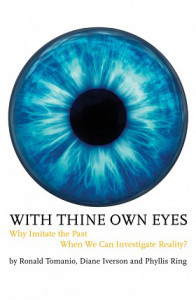
Explore more about the spiritual invitation of our times in With Thine Own Eyes: Why Imitate the Past, When We Can Investigate Reality? Find more about the book here:
Also available in print version from the publisher at: http://grbooks.com/george-ronald-publisher-books/spirituality/with-thine-own-eyes-1380638499


February 19, 2016
Thanks, Book Club Mom
Who’s that indie author?
I’m grateful and honored to be included in an author feature at Barb Vitelli’s Book Club Mom blog this week:
“My palm’s lifeline accurately predicted a lot of different facets to my work life.
I’ve experienced them with people of all ages in Asia, Europe, and the U.S., but through it all, I’ve also always been a writer. 
For years I did the writing that others needed or wanted done. I’m grateful to have lasted long enough to finally do what my heart wants: get lost with a few mysterious questions in the shaping of book-length fiction.”
Find the post at Book Club Mom:


February 16, 2016
Bearing with the unsolved
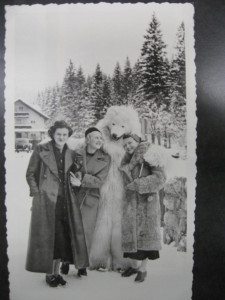
L. to R. – Gretl Braun, Eva Braun, the infamous bear, and one of the Braun sisters’ friends on a wintry day in Bavaria.
As I followed the research path of my novel, The Munich Girl, poring over hundreds of photographs from Eva Braun’s albums, there was one whose circumstances remained a complete puzzle.
It pictures her with her younger sister, Gretl, and a friend standing beside what looks like a polar bear. Not a statue or a stuffed one, mind you, but a bear up on its hind legs, “arms” around two of the women, very much a presence in their midst.

One of my days at the National Archives, examining Eva Braun’s photo albums.
Susanne Weigand finally helped me solve the mystery this week when she shared an article from the Huffington Post. It describes how photograph collector Jean-Marie Donat discovered a huge cache of photos taken in Germany between the 1920s and the 1960s, all snapped in public places, that show a wide variety of individuals posing with a hairy white bear, just like the one in Eva Braun’s photo.

U.S. soldiers in war-shattered Germany. Photo from TeddyBär, published by Innocences Bookmaker.
Donat collected these thousands of images over the years and compiled them into a book called TeddyBär. Art critic Klaus Peter Speidel writes, “The images accidentally piece together an alternative history of 20th century Germany, documenting pre-war Nazi soldiers, young German children donning Swastikas, American GIs, and everyday individuals navigating this historical time of terror and upheaval. It’s strange to see individuals isolated from their circumstances, all behaving in a relatively similar, humanizing manner: posing goofily next to a large bear.
Speidel adds: “The images, playful in their time, acquire a bittersweet aftertaste in retrospect, with each jocular shot tugging at our 21st-century memories of war, persecution and loss. In this strange compendium of posing bears and happy bystanders, Donat creates an unlikely timeline of everyday German history, one that, especially in comparison to the photo-happy present, looks frighteningly familiar.”
And one of those happy bystanders, in a photo taken early in the bear’s “career” (probably the early 1930s, judging by Eva’s hair color) was going to wind up famous for reasons she could never begin to imagine.
 Learn more about “TeddyBär , published by Innocences Bookmaker, and read the entire article here:http://www.huffingtonpost.com/entry/teddybar-vintage-found-photos-germany_us_56ba222ee4b08ffac122bc5a
Learn more about “TeddyBär , published by Innocences Bookmaker, and read the entire article here:http://www.huffingtonpost.com/entry/teddybar-vintage-found-photos-germany_us_56ba222ee4b08ffac122bc5a
More about The Munich Girl: A Novel of the Legacies that Outlast War:
http://www.amazon.com/Munich-Girl-Novel-Legacies-Outlast-ebook/dp/B01AC4FHI8/ref=tmm_kin_swatch_0?_encoding=UTF8&qid=1455564308&sr=8-1


February 12, 2016
The years without men in them

A late-day light bird’s eye view of Munich’s Frauenkirche.
A heartful of thanks to reader Faith Bowers for her reflective review of The Munich Girl:
“Phyllis Edgerly Ring is a wonderful story teller. She creates a story about Eva Braun, her friends, and the generation that survives WW2. At first you think that Eva is the main character in a historical fiction novel but there is much more.
It is a women’s book. They are strong only when needed. Eva and her friend, Peggy, seemed to be defined by the absence of their men throughout the historical period of WW2. We feel like there is truth in all that is written about their relationship.

Eva Braun and the companions with whom she spent the most time in her 16 years-in-waiting with Hitler.
Anna, Peggy’s daughter, becomes the main character, which is very well done. Though there is much foreshadowing, there are also surprises in the second half of the novel which makes it a much better story then I originally thought. I enjoyed the structure of the novel. I liked that back and forth between Peggy’s journal and current day… I also liked the different photos in front of each of the journal segments.
The men are mostly absent, just like in war, except for modern-day Hannes who supports and loves all of the women in his life.Ms. Ring’s goal was to share with us the experiences that Germans had during WW2 and this was accomplished through the many Munich women.”
Faith’s words reminded me of my aunt, who was in her early twenties during the war. Her face would still look forlorn nearly 70 years later when she’d remember, “Those were horrible years with no men in them.”
Faith also introduced me to a wonderful resource called Women’s Book Reviews:
http://www.womensbookreviews.com/default.htm

The Munich Girl: A Novel of the Legac…
Find more about The Munich Girl: A Novel of the Legacies that Outlast War here
http://www.amazon.com/Munich-Girl-Novel-Legacies-Outlast-ebook/dp/B01AC4FHI8/ref=tmm_kin_swatch_0?_encoding=UTF8&qid=1455313963&sr=8-1


February 9, 2016
Escaping the prison of our imagined past

Photo: Kathy Gilman
The spiritual nature has a value system that places priceless relationships above any object or hoped-for outcome. But the human nature, if left in charge, does not.
The sign that we’re in a situation that requires a shift from the eyes of our human nature to the vision of our spiritual one is when we find ourselves focusing on the imperfections of others to such an extent that we experience an increasing intensity of negative emotions that, in turn, causes deterioration in personal relationships.
The only escape from this vicious cycle is to change what we see, to elevate our perception, and to begin looking at others with the sin (imperfection)-covering eye of the spiritual nature.

Photo: Saffron Moser
The spiritual nature doesn’t dwell on perceived imperfections but instead seeks the missing spiritual attributes that the situation is calling for and creates an act of service designed to release those latent virtues, which exist within the heart of every soul. When that happens, the destructive negative emotions and imperfections begin to dissipate. They are, after all, merely perceptions and `decisions’ of the mind or human nature, and the resulting emotion is the energy of those thoughts in motion.
However, in the survival-motivated blind imitation that is the human nature’s customary behaviour, our mind and emotions can liken our current experience to one that has registered as negative in the past. In order to truly investigate the reality of the matter, we need the spiritual nature and its vision to come into the driver’s seat, to interrupt this reflexive imitating of what happened — or what we perceive to have happened — in the past. If we are unwilling to do this, we will remain prisoners of that past, and of what, in essence, is actually an imagined past, the perspective of the mind alone.
A sign that we’re progressing away from imitation towards investigation is that negative emotions we’ve experienced are replaced by positive ones, and there is also a noticeable improvement in the way we feel, and within the tone of our relationship with others.
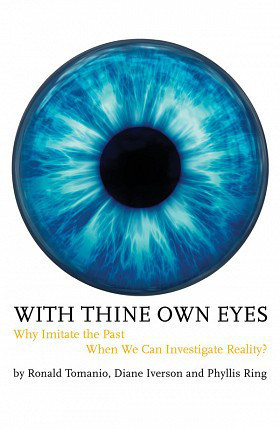
Excerpted from With Thine Own Eyes: Why Imitate the Past When We Can Investigate Reality?, from George Ronald Publisher:
Find the book here:


February 7, 2016
Winning reader words
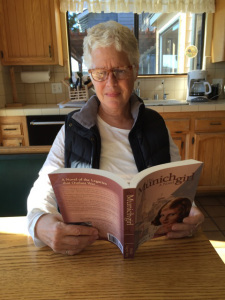 It’s fun to see the response that both the novel and the little giveaway contest I ran for Eva Braun’s birthday received over this past week.
It’s fun to see the response that both the novel and the little giveaway contest I ran for Eva Braun’s birthday received over this past week.
Thanks to all who participated, and to winners Nancy Vincent Zinke and Kathy Gilman.
Nancy wrote:
“I’d like to buy a copy for all my book-loving friends, but I think that might turn into hundreds of books. So I’m officially recommending it here and now. I love this book. It reminds me of why I fell in love with books and reading in the first place. It’s practically perfect. Thank you, Phyllis Edgerly Ring.”
And thank you, Nancy, for these words, and our glimpse into the The Munich Girl‘s visit to your cozy kitchen.
Reader Kathy Gilman, an intrepid hiker, sent a view from the part of the world my British mother came from. Thanks, too, Kathy, for these thoughts about the story:
 “Who am I? Where do I belong? Where is home?
“Who am I? Where do I belong? Where is home?
“These themes run through The Munich Girl, a book about women and their relationships with men, family, and themselves.
“It is a book about secrets – family secrets … secrets kept by Hitler from Eva (and the world) … a mystery story that begins with an old journal.
Even though this book is about ordinary relationships between people, Eva Braun and Hitler are no ordinary people. And this is no ordinary book. ” 
Find more about The Munich Girl: A Novel of the Legacies that Outlast War here:
http://www.amazon.com/Munich-Girl-Novel-Legacies-Outlast/dp/0996546987/ref=sr_1_1?ie=UTF8&qid=1454782540&sr=8-1&keywords=The+Munich+Girl


February 4, 2016
Wars don’t end when the shooting stops

The Munich Girl: A Novel of the Legac…

Charles Johann Palmié Munich (Marienplatz) 1907
So grateful to New Hampshire novelist Betsy Woodman for these thoughts she shared after reading The Munich Girl:
A novel of the legacies that outlast war
Wars don’t end when the shooting stops. In the fields of Belgium and Northern France, people are still being killed by accidentally unearthed bombs—from World War I.
We also continue to process World War II—in books, in movies, in the care and tending of monuments—and in our hearts.
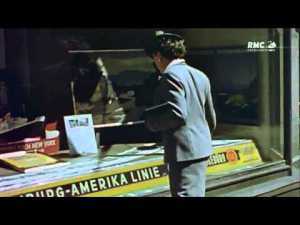
A shot Eva Braun took of her mother looking in a travel agent’s window around 1937.
Along with the more visible damage, war creates mysteries that leave people feeling uneasy and incomplete. Confusion and grief may particularly affect the war brides who leave home with their foreign soldier husbands, and curiosity about their parents’ past may nag at the children of such marriages.
In Ring’s thought-provoking The Munich Girl, Anna Dahlberg is the child of just such a war marriage. Her mother had both British and German heritage; her dad was an American soldier. We first see Anna in 1995, choked with panic in her airplane seat and clutching a handkerchief embroidered with a four-leaf clover. Mysteries abound: what earlier trauma has produced this state? Why is Anna headed for Germany? What will she unearth in her exploration of events that started over half a century ago?
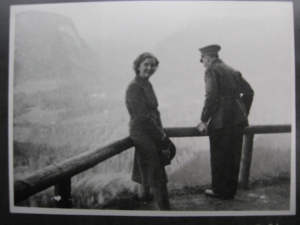
Eva Braun and her infamous companion.
Foremost in Anna’s mind is the question, was her mother really a close friend of Adolf Hitler’s mistress (and wife for 40 hours), Eva Braun?
The Munich Girl is not always comfortable to read. Hearing Hitler referred to as “Adi” in conversation will make some readers squirm. Until they think—well, even villains have someone who loves them. In life, as in fiction, so much is a matter of point of view. The reader is invited to stretch and understand people like Eva Braun, who don’t usually arouse much sympathy.
Ignorance of one’s past and of the people in it can leave a person feeling frustrated, baffled, and empty. Knowledge and reconnection are the cure. The Munich Girl is about healing, rediscovery, and finding one’s way out of the darkness into a bright future. Phyllis Edgerly Ring’s international perspective and deep sympathy for human beings shine through in this unorthodox and subtle tale. ~ Betsy Woodman
 Find information about Betsy Woodman’s delightful India-based novels –
Find information about Betsy Woodman’s delightful India-based novels –
Jana Bibi’s Excellent Fortunes,
Love Potion Number 10, and
Emeralds Included here:
http://www.amazon.com/Betsy-Woodman/e/B007CLOK7Y/ref=sr_tc_2_0?qid=1454528756&sr=1-2-ent



